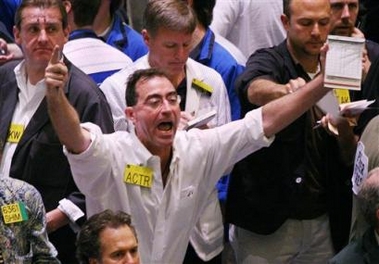Oil prices slipped Thursday as OPEC appeared set to maintain current crude
output and a day after the United States signaled a willingness to hold direct
talks with Iran on its nuclear program.

Traders deal in oil futures at the New York
Mercantile Exchange Wednesday, May 31, 2006. Plunging oil prices pushed
stocks sharply higher Wednesday as the United States' latest move to
settle the dispute over Iran's nuclear arms program eased worries about a
supply cutoff from the petroleum-rich nation.
[AP] |
The U.S. Energy Department was also expected to release a report on U.S.
inventories later Thursday.
Light sweet crude for July delivery on the New York Mercantile Exchange fell
42 cents to $70.87 a barrel in electronic trading at midday in Europe. It fell
74 cents a barrel on Wednesday.
July Brent crude at London's ICE Futures exchange fell 53 cents to $69.88 a
barrel on Thursday.
In Caracas, Venezuela, major oil-producing countries are set to keep crude
output unchanged at the OPEC meeting Thursday despite Venezuela's calls for
cutting production. However, some cartel members hinted at the possibility of
trimming supplies down the road.
Antoine Halff, oil economist at Paris-based Fimat, said there was not a
strong case for OPEC to tighten production.
"Prices averaged at their highest levels in nominal terms in May, a fact that
many OPEC oil ministers like to blame on geopolitics and financial players,"
Halff said. "But in fact, market fundamentals have shown signs of strength in
recent weeks."
Yasser Elguindi, senior managing director at Medley Global Advisors in New
York, said that just beneath the surface of OPEC's accommodative stance is the
fear of being caught off guard in the second half of the year, if weaker
economic growth cuts into oil demand or if improved diplomatic relations between
the West and Iran help ease the so-called fear premium in the price of crude.
On the possibility of direct negotiations with Iran, U.S. Secretary of State
Condoleezza Rice said Iran first must agree to stop disputed nuclear activities
that the West fears could lead to a bomb.
But Iran rejected this latest diplomatic effort after oil markets closed,
calling the offer "a propaganda move."
Before Iran dismissed the U.S. offer, BNP Paribas Commodity Futures broker
Tom Bentz said oil prices would "go right back up again" if Rice's effort
failed.
Gasoline futures dipped to $2.0830 a gallon, down 1.3 cents, and heating oil
prices fell 1.3 cents to $1.9821 a gallon in electronic trading on Thursday.
Natural gas prices rose 4.1 cents to $6.425 per 1,000 cubic feet.
Last week, U.S. inventory data showed domestic natural gas inventories
swelling by 83 billion cubic feet in the past week to 2.16 trillion cubic feet,
or 50 percent above the five-year average for this time of year.
Natural gas futures are near a one-year low and some analysts say that if
inventories continue to grow at this pace, the United States could run out of
natural-gas storage capacity before winter, a prospect which should further
exert downward pressure on prices.